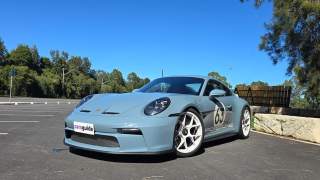
Lexus LF-FC concept unveiled at the 2015 Tokyo motor show
- Lexus News
- Toyota News
- Lexus Sedan Range
- Toyota Sedan Range
- Sedan
- Lexus
- Toyota
- Concept Cars
- Motor shows
Forget electric cars, this thing is the bomb.
We may not have got the flying cars promised by Back to the Future, but Lexus has given drivers a glimpse of the future by unveiling a hydrogen-powered sports car with a hologram on the dash.
The sleek-lined four-door coupe concept car, unveiled at the Tokyo motor show today, sends a clear message that hydrogen-powered cars are the long term future of motoring.
"The future has suddenly got very close," Lexus Australia boss Sean Hanley says.
He says the car will be on the road in the next five to ten years.
"What we dreamed about ten years ago is now our probable future," he says.
Hybrid was never the end game of cleaner technology
Lexus is the luxury arm of the world's biggest car company, Toyota, the brand that brought the world hybrid technology in 1997. Hydrogen cars have an advantage over electric cars because they have the same range as a petrol car and can be refilled in minutes, where EVs take hours to charge.
Hanley says hybrid vehicles are only stepping stones to fuel cells.
"Hybrid was never the end game of cleaner technology," he says.
The concept car, dubbed LF-FC (Lexus future fuel cell) comes on the back of the recent launch of a production fuel-cell car by parent company Toyota. Toyota and Honda also showed off fuel-cell cars at the show.
The LF-FC concept uses a high-output fuel cell to drive the rear wheels and also sends power to two in-wheel motors in the front. Lexus says the system will give drivers better control with drive at all four wheels. Lexus has not released any performance figures for the car, but the fact that it is a top-end sports coupe suggests it will be comparable with their current top of the line V8s.
It also has the latest hi-tech gadgets in the cabin. The driver can operate controls by making hand gestures in front of a hologram on the centre console.
Fuel cell cars still face big obstacles, not least the enormous task of setting up a hydrogen refuelling infrastructure to replace petrol stations. Australia has only one hydrogen car refuelling station in the entire country, and it is owned by rival Hyundai.
But many car companies believe it is the ultimate replacement for petrol cars, as fuel-cells have longer range than electric cars and can be filled up in minutes, compared with the hours it takes to recharge an electric battery.
Hanley says the company won't invest directly in hydrogen infrastructure but is looking to partner with other companies to bring the technology to Australia.
The Lexus was one of the stars of a Tokyo motor show where sports cars were the main event. Toyota unveiled a concept that is likely to become the world's most affordable sports car, while Mazda resurrected the rotary engine with a car that is a spiritual successor to the RX7. Honda also displayed the production version of its hybrid supercar, the reborn NSX.










Comments